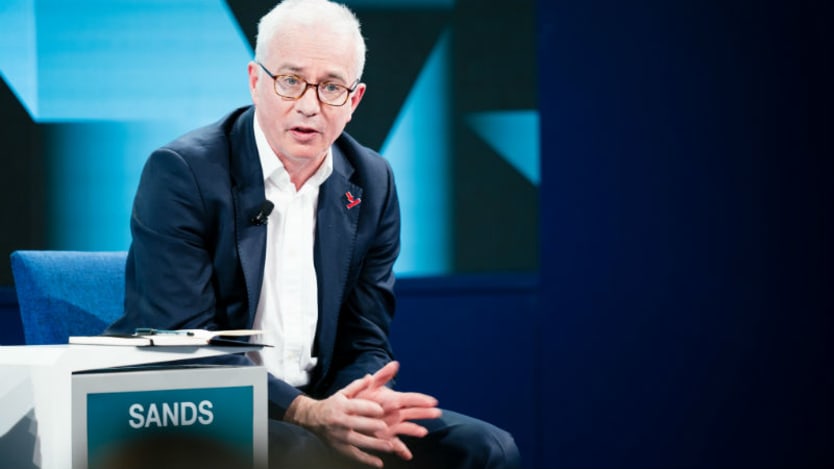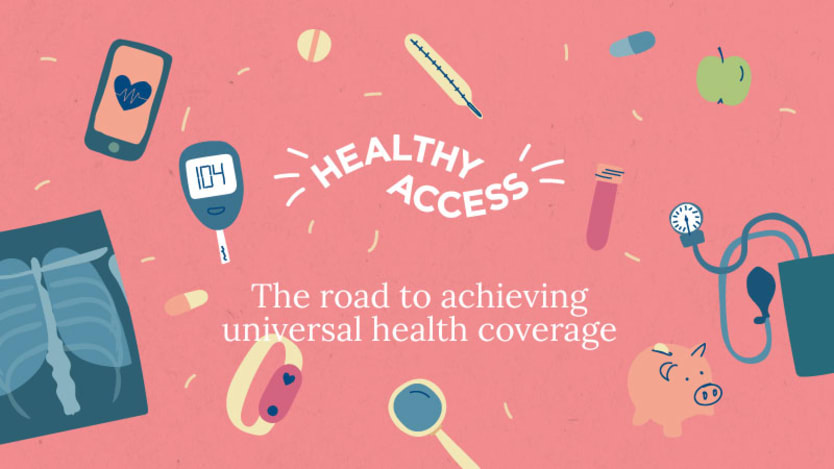
NEW YORK — On a recent visit to a remote Ethiopian village, Global Fund to Fight AIDS, Tuberculosis and Malaria Executive Director Peter Sands talked with an experienced health care worker about her caseload.
Ten years ago, the health worker used to focus only on treating people dying of malaria, she told Sands. She had seen one malaria case several weeks prior, but malaria deaths in Ethiopia have dropped by 58% from 2000 to 2017. Her daily work has evolved and now consists of developing a measles vaccination program, or carrying out antenatal work.
“By getting rid of heavy disease burden, in this case malaria, you actually create a lot of capacity in the system to do other things,” Sands told Devex in a recent phone interview.
The rise of digital health and its potential to push progress on UHC
This year's World Health Assembly focused on UHC but did not prioritize climate resilience in its planning. As all nations face climate change, achieving equity in health care will require climate-resilient health systems, writes Diana Schoder of the Council on Foreign Relations.
The Global Fund is seeking at least $14 billion at its October replenishment to dramatically reduce the incidence of HIV, TB, and malaria over the next three years. But the fund’s work is increasingly not just about these three diseases, Sands explained. He discussed with Devex what it means to focus on universal health coverage and the need to look at prevention, as much as treatment, of major diseases.
“Treatment is part of prevention, but there is also an element of prevention that goes into broader issues around inequality, some of which are quite difficult, structural things that take time to fix.”
— Peter Sands, executive director, Global FundThis conversation has been edited for length and clarity.
You wrote recently about a debate on the need to focus on universal health care or disease-specific interventions. How do you view this?
There is a false dichotomy because to end the big epidemics you need to have health systems that work. And a health system that is not dealing effectively with the big epidemics is not a very effective health system.
Do you think there is a shift at all in public rhetoric on the need to connect all of these goals?
The rhetoric is shifting more in reality, in the sense that the reality always involves a degree of investment in the underlying health systems. There is a sort of more explicit recognition that one needs to be sort of doing the two things simultaneously, but maybe there is more focus on how we do that most effectively.
There’s been talk about how universal health coverage will be financed, ahead of the September high-level meeting at the U.N. Do you see a need for more explicit funding for UHC?
The pathway to UHC is not something you reach by investing in something called UHC. You make that pathway by building parts of the health systems, addressing the health care needs of a specific population and by addressing specific conditions. It will inevitably involve a mix of focusing on specific segments of populations, specific diseases and functional components of the system. The good thing about it is that the UHC discussion is putting a lot of attention on, “How does one think about that journey towards a broad set of care services for all populations, through a system that is financially sustainable?” You are still going to come down to, “OK, so what are we going to do tomorrow and where will we put the dollars?”
I understand that the Global Fund has become better at treating diseases, but has not done as well at preventing them. How is this influencing your work?
When the fund was first created the imperative was to stop so many people dying. As we have succeeded in reducing the death tolls, the objective has become more that we want to stop people dying, but we also want to end the epidemics. The challenges involved in prevention can be different from the challenges of stopping people dying. Treatment is part of prevention, but there is also an element of prevention that goes into broader issues around inequality, some of which are quite difficult, structural things that take time to fix.
When you are addressing prevention it can be complicated to figure out what issues to prioritize and target individually.
A good example is rates of HIV infection in young adolescent girls in Southern Africa. About a thousand girls a day are being infected and they are more vulnerable than young men are at the same age. Part of the answer is to ensure that those young women who get infected are treated, but also to deal with some of the underlying structural gender inequality issues that make these young women so vulnerable. Increasingly, we need to focus on that broader agenda with our partners, in addition to the more classic agenda.
With the lead-up to the Global Fund’s replenishment meeting in October, do you think there is a strong understanding of why more money is needed for your work?
I think there has been broad acceptance of the logic of our investment case. That does not mean we automatically get the money, because there are other budget concerns and priorities, but most donors understand the logic of what we are saying. We have to step up the fight. It is not just about money — it is about innovation, making collaborations more effective, making the execution more data-driven — but it is also about more money.
Most of that needs to come from the governments of countries where the diseases are most prevalent, but some of that money needs to come from donors. If we are serious about being on track towards ending the epidemics, we need to do that now. No one has suggested there is a route to achieving that objective that does not require the kind of money we are talking about.
For a closer look at the innovative solutions designed to push for progress on universal health coverage around the globe, visit the Healthy Access series here.









